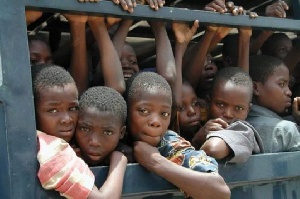Around 63 million adolescents between the ages of 12 to 15 years, are denied their right to education, UNESCO/UNICEF Report said.
A statement issued by UNICEF and copied to the Ghana News Agency in Accra said, a new joint report from the UNESCO Institute for Statistics and UNICEF; Fixing the Broken Promise of Education for All: Findings from the Global Initiative on Out-of-School Children made this known during the Education World Forum.
According to the statement, globally one in five adolescents is not in school, compared to one in 11 primary school-age children. So adolescents are twice as likely to be out of school as their younger counterparts. The Report, funded by the Global Partnership for Education, also shows that as children get older, the risk that they will never start school or will drop out increases.
The statement said in total, 121 million children and adolescents have either never started school, or dropped out, despite the international community’s promise to achieve Education for All by 2015.
Data show that there has been almost no progress in reducing this number since 2007. Children living in conflict, child labourers and those facing discrimination based on ethnicity, gender and disability are the most affected. There is also a growing concern that previous gains in expanding access to education will erode without a major shift in policies and resources.
“Business as usual strategies based on more teachers, more classrooms and more textbooks are not enough to reach the most disadvantaged children,” said UNESCO Director-General Irina Bokova. “We need targeted interventions to reach the families displaced by conflict, the girls forced to stay home, the children with disabilities and the millions obliged to work. But these policies come at a cost. This report serves as wake-up call to mobilise the resources needed to guarantee basic education for every child, once and for all.”
It noted that as pressure mounts to include universal secondary education in the post-2015 global development agenda, the Report shows the way forward to break the barriers that keep children out of school. If current trends continue, 25 million children – 15 million girls and 10 million boys – are likely never to set foot inside a classroom.
“To realize the promise of universal education for every child, we need a global commitment to invest in three areas: getting more children into primary school; in helping more children – especially girls – stay in school through the secondary level; and improving the quality of the learning they receive throughout their schooling,” said UNICEF Executive Director Anthony Lake.
“There should be no debate among these priorities: we need to do all three, because the success of every child – and the impact of our investment in education – depends on all three.”
The highest out-of-school rates are in Eritrea and Liberia, where 66 per cent and 59 per cent of children, respectively, do not go to primary school.
In many countries, the rates of exclusion are even higher for older children, especially girls. In Pakistan, 58 per cent of adolescent girls roughly between the ages of 12 and 15, are out of school compared to 49 per cent of boys.
Poverty is the greatest barrier to education, according to the Report. In Nigeria, two-thirds of children in the poorest households are not in school, and almost 90 per cent of them will probably never enrol. In contrast, only 5 per cent of the richest children are out of school and most of them are expected to start in the future.
UNESCO and UNICEF believe that new policies must focus specifically on the most marginalized children, as part of larger efforts to improve access to and quality of education.
To do this, governments need robust information on who these children are, where they live, whether they have ever attended school and if they are likely to do so in the future. But many of these children remain invisible within current data collection methods. Children with disabilities are amongst the least visible – reliable data simply don’t exist – and they are being overlooked in national responses to out-of-school children.
The Report calls for action to invest in better data and demonstrates that reaching the most marginalized may initially cost more but also yields greater benefits. Better statistics and innovative tools can help guide governments and donors to allocate their education funding more effectively and efficiently.
The statement also indicated that the Out-of-School Children Initiative– a partnership between UNICEF and the UNESCO Institute for Statistics – is working in more than 50 countries to identify which children are out of school, assess the barriers that exclude them and develop innovative policies to get them in classrooms and learning.
General News of Wednesday, 21 January 2015
Source: GNA













